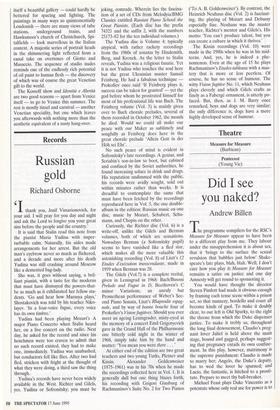Records
Russian gold
Richard Osborne
Ithank you, Josif Vissarionovich, for your aid. I will pray for you day and night and ask the Lord to forgive you your great sins before the people and the country.'
It is said that Stalin read this note from the pianist Maria Yudina with imper- turbable calm. Naturally, his aides made arrangements for her arrest. But the old man's eyebrow never so much as flickered, and a decade and more after his death Yudina was still crashing around Moscow like a demented bag-lady.
She was, it goes without saying, a bril- liant pianist, with a taste for the moderns that must have dismayed the powers-that- be as much as it exhilarated her fellow stu- dents. 'Go and hear how Marusya plays,' Shostakovich was told by his teacher Niko- layev. 'In a four-voice fugue, every voice has its own timbre.'
Yudina had been playing Mozart's A major Piano Concerto when Stalin heard her, on a live concert on the radio. Next day, he asked for the record and since his henchmen were too craven to admit that no such record existed, they had to make one, immediately. Yudina was unabashed, but conductors fell like flies. After two had fled, stricken with fright at the thought of what they were doing, a third saw the thing through.
Yudina's records have never been widely available in the West. Richter and Gilels, yes. Yudina or Sofronitsky; you must be joking, comrade. Wherein lies the fascina- tion of a set of CDs from Melodyia/BMG Classics entitled Russian Piano School: the Great Pianists. (Each disc has the prefix 74321 and the suffix 2, with the numbers 25173-82 for the ten individual volumes.) The Yudina disc is Volume 4; typically atypical, with rather rackety recordings from the 1960s of sonatas by Hindemith, Berg, and Krenek. As the letter to Stalin reveals, Yudina was a religious fanatic. Yet it is not Yudina who touches the soul here but the great Ukrainian master Samuil Feinberg. He had a fabulous technique — Prokofiev once said 'If Feinberg plays it, success can be taken for granted' — yet the god before whom he prostrated himself for most of his professional life was Bach. The Feinberg volume (Vol. 3) is mainly given over to Bach chorale preludes, several of them recorded in October 1962, the month he died. Would we could all make our peace with our Maker as sublimely and songfully as Feinberg does here in the great chorale prelude `Allein Gott in der Hoh sei Ehr'.
No such peace of mind is evident in Sofronitsky's late recordings. A genius, and Scriabin's son-in-law to boot, but cabined and confined by the Soviet authorities, he found increasing solace in drink and drugs. His reputation undimmed with the public, his records were avidly sought, sold out within minutes rather than weeks. It is dreadful to contemplate the sums that must have been fetched by the recordings reproduced here in Vol. 5, the one double- album in the edition: Russian music on one disc, music by Mozart, Schubert, Schu- mann, and Chopin on the other.
Curiously, the Richter disc (Vol. 6) is a write-off, unlike the Gilels and Berman volumes, both of which are sensations. Nowadays Berman (a Sofronitsky pupil) seems to have vanished like a fled star, which makes all the more valuable this astonishing recording (Vol. 8) of Liszt's 12 Etudes d'execution transcendante, made in 1959 when Berman was 28.
The Gilels (Vol.7) is a complete recital, given in Leningrad in 1968: Bach/Busoni Prelude and Fugue in D, Beethoven's C minor Variations, an unruly but Promethean performance of Weber's Sec- ond Piano Sonata, Liszt's Rhapsodie espag- nole, and by way of bonne bouche four of Prokofiev's Vision fugitives. Should you ever meet an ageing Leningrader, misty-eyed at the memory of a concert Emil Grigoryevich gave in the Grand Hall of the Philharmonic one bitterly cold night in the winter of 1968, simply take him by the hand and mutter: 'You mean you were there . . . '
At either end of the edition are two great teachers and two young Turks, Pletnev and Kissin. Alexander Goldenweiser (1875-1961) was in his 70s when he made the recordings collected here in Vol. 1. It is generally dull but one thing blazes forth, his recording with Grigori Ginsburg of Rachmaninov's Suite No. 2 for Two Pianos (`To A. B. Goldenweiser'). By contrast, the Heinrich Neuhaus disc (Vol. 2) is fascinat- ing, the playing of Mozart and Debussy especially fine. Neuhaus was the master teacher, Richter's mentor and Gilels's. His motto: 'You can't produce talent, but you can create a culture in which it thrives.'
The Kissin recordings (Vol. 10) were made in the 1980s when he was in his mid- teens. And, yes, he is indeed a phe- nomenon. Even at the age of 15 he plays Rachmaninov's Etudes-tableaux with a mas- tery that is more or less peerless. Of course, he has no sense of humour. The witty Vision fugitive No. 11, which Neuhaus plays cleverly and which Gilels crafts as finely as a Faberge ornament, is utterly po- faced. But, then, as J. M. Barry once remarked, boys and dogs are very similar; the only difference is, dogs have a more highly developed sense of humour.


































































 Previous page
Previous page